Want to hire JavaScript developer? Then you should know!
- Hire a JavaScript (JS) Programmer and Become the Owner of a Trendy Product
- Applications That Can Be Developed in JS
- Popular JS Frameworks and Their Purpose
- The most popular frameworks include the following:
- JS Indispensability: Reality or Exaggeration?
- Where to Hire a JavaScript Professional?
- Benefits of Outsourcing JavaScript Development for Your Business
- Hire JavaScript Consultants
- Hire the Best JavaScript Specialist on Upstaff
Hire a JavaScript (JS) Programmer and Become the Owner of a Trendy Product
JS is one of the most well-known languages in the modern programming world. It is mainly used to create user-friendly and interactive websites.
Statista analytics shows that JavaScript tops the ranking of the most popular languages among global developers – it is used by 63.6% of respondents to the survey.

Source: Statista
Other data shows that 98.3% of all websites use JS as a client-side programming language.
However, this does not mean that JS is used only in web development. There are many frameworks built on this language that allow you to create dynamic, cross-platform applications for iOS and Android mobile devices, digital solutions for smartwatches, and even software for controlling flying robots.
If your mission is to get a user-friendly and high-quality digital solution that will become a real business card of your brand, it is time to hire a JS expert. In this article, you will learn when you need a skilled JavaScript developer and how to choose the best person for the job.
Applications That Can Be Developed in JS
JS is a cross-platform, object-oriented programming language whose syntax is based on Java and C. It contains types, operators, standard built-in objects, and methods.
This language allows IT professionals to use dynamically updated content in their products, including animated objects, interactive elements, pop-ups, and much more.
Without this language, programmers would have had to rely on CSS’s capabilities, which are limited to adding animations. And most web pages would still be static.
Thanks to such amazing features, the use of JS has long gone beyond the creation of web pages. Today, an experienced JavaScript developer can create other digital solutions, including:
- Interactive presentations. JS-based frameworks support functions that allow you to create presentations and slideshows in the form of websites. Developers can use animated lists, highlighting, interactive slides, personalized themes, etc.
- Applications for smart devices. Do you need a digital solution for your smartwatch or TV? Feel free to look for a JavaScript coder for hire. As a plus, you can develop software for robotic devices such as drones or quadcopters.
- Server-side applications. JS allows you to reduce the processing time of HTTP requests, automate tasks, and create server components. Many global giants, including Walmart, GoDaddy, PayPal, and Uber, have chosen JS to develop their server software.
Are you still on the fence about the technology stack for app development? Let’s take a look at the advantages of JS, which will become another argument in favor of JavaScript dev hiring.
Popular JS Frameworks and Their Purpose
Modern developers have a lot of progressive JS frameworks at their disposal, which are actively used to create complex applications and web resources. They are pre-written JS code libraries that provide programmers with ready-made functions and utilities to simplify the development process.
The most popular frameworks include the following:
- AngularJS. This is an open-source structural front-end framework. It allows you to improve the HTML syntax with specific directives that help you create dynamic digital solutions. Its scope is mostly limited to the development of single-page web applications (SPAs).
- Node.js. This is a universal JS code interpreter based on the V8 engine, which, thanks to constant improvements, can be used not only for creating ordinary websites. Nowadays, this framework allows you to develop various digital solutions, including CMS, IoT applications, ecommerce platforms, streaming services, and much more.
- jQuery. This is a lightweight JS library that works based on the interaction of this programming language with HTML. It simplifies the creation of interactive, dynamic user interfaces thanks to a convenient API that works in many browsers.
All the frameworks listed above have powerful functionality, a large ecosystem of tools, and reliable community support. This makes their use appropriate for creating progressive, competitive digital solutions.
JS Indispensability: Reality or Exaggeration?
The demand for JS among IT specialists is quite justified. After all, this programming language has several advantages:
- Ensuring interactivity. The use of JS guarantees a dynamic user experience on the client’s side.
- Large ecosystem of interfaces. There are many JS frameworks and libraries that offer numerous components and interfaces that can be used to create responsive digital products.
- High performance. Innovative engines such as V8 allow you to use JS for complex computing and real-time application development.
The conclusion is self-evident: A JavaScript development team is essential for any business that wants to stay ahead of its opponents. But what should you do if you don’t have such a spot in your staff? Let’s talk about it further.
Where to Hire a JavaScript Professional?
If you are thinking about creating a modern mobile or web application, you will definitely face the question of where to seek a reliable JavaScript developer partner. There are several options:
- Find a JavaScript developer on staff.
Hiring an in-house specialist is safer in terms of ensuring the quality of the software product. But at the same time, this leads to additional costs, such as training and adaptation of staff, etc.
- Hire a remote JavaScript developer for the project.
This option is best suited for freelancers who want to get high-quality JS development services for an adequate price. The main thing is to contact a trusted JavaScript development agency. Only such a provider will be able to find a specialist for your needs.
So, which JavaScript dev hiring option should you choose?
Benefits of Outsourcing JavaScript Development for Your Business
It is most advisable to contact a JavaScript developer contractor. This choice is due to a number of advantages of this hiring method:
#1: Access to a pool of experienced programmers in your industry
You’ll be able to hire a JavaScript specialist with the knowledge and skills required for your project. Expertise in your business area can speed up development time and provide high results.
#2. Efficient use of the budget
The services of a remote JS specialist can be more cost-effective than employing an in-house programmer. As a principle, you can avoid the costs of recruiting, training, and creating the appropriate infrastructure.
#3. Scalability
Is a JavaScript developer needed? Outsourcing makes it easy to increase the size of your team. No longer require a specialist? That’s not a hassle either – just cancel their services after the project is over.
#4. Access to the latest technologies
Outsourcing companies usually follow the latest trends in the JS ecosystem. Therefore, you can be sure that the hired specialist will use innovative tools and technologies to work on your project.
#5. Comprehensive project support
The top IT recruitment platforms offer not only software development services but also full JavaScript developer support after the release. You can also hire a JavaScript consultant to strengthen your team.
Hire JavaScript Consultants
Need JavaScript consultants to untangle your web project or build something fresh? At Upstaff, our JavaScript pros bring deep know-how to the table, ready to code up slick front-ends, beefy back-ends, or full-stack apps that deliver. They’re wizards with modern JS—think React, Node.js, or vanilla JavaScript—turning your ideas into fast, user-friendly solutions. Whether you’re revamping an e-commerce site, launching a SaaS tool, or debugging a legacy mess in 2025, our consultants step in with practical fixes and big-picture smarts.
These folks don’t just code—they strategize. They’ll dive into your stack, spot bottlenecks, and whip up everything from responsive UIs to server-side APIs that scale. Our JavaScript consultants have seen it all, from optimizing webpack builds to wrestling with async bugs. Hiring with us gets you seasoned pros who can guide your team, boost performance, and keep your web development humming, all tailored to your goals and deadlines.
Hire the Best JavaScript Specialist on Upstaff
Still, wasting your time browsing JavaScript developer jobs? Look for the right specialist on Upstaff.
After all, cooperation with us means:
- The assistance of our recruiters in choosing a specialist.
- Transparent pricing system.
- Quality assurance of the services provided.
Don’t rely on fortune by hiring unverified programmers. Contact the Upstaff manager and be sure of your choice!
- Hire a JavaScript (JS) Programmer and Become the Owner of a Trendy Product
- Applications That Can Be Developed in JS
- Popular JS Frameworks and Their Purpose
- The most popular frameworks include the following:
- JS Indispensability: Reality or Exaggeration?
- Where to Hire a JavaScript Professional?
- Benefits of Outsourcing JavaScript Development for Your Business
- Hire JavaScript Consultants
- Hire the Best JavaScript Specialist on Upstaff



